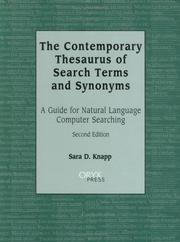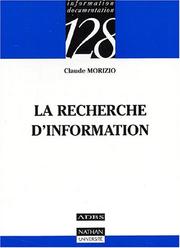| Listing 1 - 10 of 24 | << page >> |
Sort by
|
Book
ISBN: 9781442238855 9781442238848 Year: 2015 Publisher: Lanham : Rowman & Littlefield,
Abstract | Keywords | Export | Availability | Bookmark
 Loading...
Loading...Choose an application
- Reference Manager
- EndNote
- RefWorks (Direct export to RefWorks)
Online Searching puts the aspiring librarian on the fast track to becoming an expert searcher who unites library users with trusted sources of information to answer their questions. To accomplish this, it ushers you through online searching as a seven-step process: (1) determining what the user really wants in the reference interview, (2) identifying sources that are likely to produce relevant information for the user's query, (3) dividing the query into big ideas and combining them logically, (4) hypothesizing whether a known item or a subject will satisfy the query, (5) representing the query as input to the search system, (6) conducting the search and responding strategically, and (7) displaying retrievals, assessing them, and responding tactically. For key concepts, Online Searching enlists multimedia, representing visually what is difficult to convey via words alone. When you analyze Online Searching's real search topics, search online, and compare your results with its suggested answers, you'll experience the seven-step online searching process first-hand. Included are specific recommendations about what you should teach end users about online searching and a method for quickly and efficiently familiarizing yourself with a new database and search system. Including short video demonstrations, Online Searching is your go-to guidebook for ramping yourself up from novice to expert searcher.
Book
ISBN: 0765408408 Year: 2002 Publisher: Paris : Editions du Cercle de la librairie,
Abstract | Keywords | Export | Availability | Bookmark
 Loading...
Loading...Choose an application
- Reference Manager
- EndNote
- RefWorks (Direct export to RefWorks)
Book
ISBN: 9781856046480 1856046486 Year: 2008 Publisher: London : Facet,
Abstract | Keywords | Export | Availability | Bookmark
 Loading...
Loading...Choose an application
- Reference Manager
- EndNote
- RefWorks (Direct export to RefWorks)
Book
ISBN: 2200340796 9782200340797 Year: 2005 Volume: 267 Publisher: Paris: Armand Colin, ADBS,
Abstract | Keywords | Export | Availability | Bookmark
 Loading...
Loading...Choose an application
- Reference Manager
- EndNote
- RefWorks (Direct export to RefWorks)
L'ADBS, association des professionnels de l'information et de la documentation, a pour objectif la promotion et la valorisation des professions d'un secteur que les nouvelles technologies ont révolutionné. Le développement des technologies de l'information et de la communication a mis à la portée du plus grand nombre une très importante diversité de sources et de supports. De ce fait, trouver l'information dont on a besoin requiert aujourd'hui la maîtrise d'outils techniques et de procédures de traitement de l'information. Mais c'est aussi se livrer à une activité cognitive complexe, et entrer en dialogue avec des systèmes dont la logique n'est pas toujours évidente. Cet ouvrage se propose de clarifier les fonctionnements techniques des outils et de choisir les procédures les plus efficaces de recherche d'information en aidant l'usager à mieux définir sa stratégie de recherche. Le médiateur y trouvera une pluralité d'approches de la recherche d'information susceptible d'éclairer les méthodes et les comportements de son public.

ISBN: 157356107X Year: 2000 Publisher: Phoenix, AZ : Oryx Press,
Abstract | Keywords | Export | Availability | Bookmark
 Loading...
Loading...Choose an application
- Reference Manager
- EndNote
- RefWorks (Direct export to RefWorks)
Electronic information resource searching --- English language --- Social sciences --- Recherche de l'information électronique --- Anglais (Langue) --- Sciences sociales --- Terms and phrases --- Terminology --- Mots et locutions --- Terminologie
Book
ISBN: 9782744024603 Year: 2011 Publisher: Paris : Pearson Education,
Abstract | Keywords | Export | Availability | Bookmark
 Loading...
Loading...Choose an application
- Reference Manager
- EndNote
- RefWorks (Direct export to RefWorks)
Fondé sur de multiples exemples, l'ouvrage recense toutes les possibilités offertes par la nouvelle façon de rechercher l'information sur Internet. Conseils pour découvrir les rouages de Google et percer à jour tous ses secrets. En appliquant cette méthode à ses requêtes, on obtient des listes de résultats beaucoup plus courtes et pertinentes.
Multi
ISBN: 9781783300341 9781783300730 1783300736 1783300345 Year: 2015 Publisher: Londen Facet publishing
Abstract | Keywords | Export | Availability | Bookmark
 Loading...
Loading...Choose an application
- Reference Manager
- EndNote
- RefWorks (Direct export to RefWorks)
An up-to-date showcase of the innovative and inspiring work that libraries are doing across the world to interact with their users and deliver resources via mobile devices.This brand new edition of the highly successful M-Libraries series brings together cutting-edge international contributions from the leading experts, practitioners and researchers in the field. Based on the proceedings of the Fifth International M-Libraries Conference held at the Chinese University of Hong Kong in 2014, it illustrates the diversity of innovative and inspiring work that libraries are doing across the world to interact with their users and deliver resources via mobile and hand-held devices.With a foreword from Joan K Lippincott and 22 chapters from 13 countries, as far apart as India and Germany, Hong Kong and Zimbabwe, Scotland and Bangladesh, the book explores the following themes:"Best practice for the use of mobile technologies in libraries"Challenges and strategies involved in embracing mobile innovation for libraries"The impact of ubiquitous and wearable technologies on the future of libraries"Harnessing the future for teaching and learning with mobile technologies"Mobile technologies enhancing information access for all and pursuing the millennium development goals.As the world becomes more mobile, users will access information using mobile technologies. Hence, libraries have to make the transition to provide mobile service. M-Libraries 5 will help libraries to develop adaptable and efficient mobile services so they can meet the needs of the current and new generations of users.Readership: Information professionals in all sectors and researchers, educators, technical developers, managers and library professionals. It will also be invaluable for students of library and information science and newcomers to the profession.Uit: http://www.facetpublishing.co.uk/title.php?id=300341&category_code=604&utm_source=Communicator_facet_mailing_list&utm_medium=Email&utm_content=mlibs8&utm_campaign=Focus+on%3a+mobile+technology+in+libraries#about-tab
Telecommunication technology --- Library automation --- Electronic information resource searching. --- Mobile communication systems. --- Wireless communication systems. --- Recherche de l'information électronique --- Radiocommunications mobiles --- Transmission sans fil --- Recherche de l'information électronique

ISBN: 2091912441 9782091912448 Year: 2002 Volume: 267 Publisher: Paris: Fernand Nathan, ADBS,
Abstract | Keywords | Export | Availability | Bookmark
 Loading...
Loading...Choose an application
- Reference Manager
- EndNote
- RefWorks (Direct export to RefWorks)
Library research --- Electronic information resource searching --- Recherche documentaire --- Recherche de l'information électronique --- Information Storage and Retrieval --- Information Science --- Recherche de l'information électronique --- Outil d'information --- Recherche de l'information electronique
Book
ISBN: 291022760X 9782910227609 Year: 2005 Volume: 3 Publisher: Villeurbanne: Presses de l'ENSSIB,
Abstract | Keywords | Export | Availability | Bookmark
 Loading...
Loading...Choose an application
- Reference Manager
- EndNote
- RefWorks (Direct export to RefWorks)
Aujourd'hui les recherches documentaires dans des collections numérisées sont devenues incontournables et quotidiennes pour qui doit s'informer, étudier ou se former. Si l'utilisation des outils et des moteurs est familière, les mécanismes qu'ils emploient ne sont eux pas forcément connus. Cet ouvrage est consacré aux connaissances fondamentales, à savoir, les bases de la linguistique et de la logique informatique pour comprendre les traitements auxquels les requêtes et les textes sont soumis. Il réserve une part importante aux techniques existantes comme la recherche sur la proximité phonétique, syntaxique ou sémantique, étendue au multilinguisme. Des notions apparemment banales comme mot vide, terme, synonyme, lemmatisation sont expliquées dans ce contexte. Des exercices corrigés et des exemples issus d'applications diverses comme les pages jaunes de l'annuaire, les bases de brevets, et même la Toile appuient les apports théoriques.
Electronic information resource searching --- Computational linguistics --- Natural language processing (Computer science) --- Recherche de l'information électronique --- Linguistique informatique --- Traitement automatique des langues naturelles --- Recherche de l'information électronique
Book
ISBN: 9782091620435 2091620432 Year: 2012 Volume: 25 Publisher: Paris: Fernand Nathan,
Abstract | Keywords | Export | Availability | Bookmark
 Loading...
Loading...Choose an application
- Reference Manager
- EndNote
- RefWorks (Direct export to RefWorks)
Rédigé par des professionnelles de l'information-documentation, cet ouvrage présente une méthodologie de la recherche d'information. Il propose des outils, des ressources et des lieux à connaître pour réussir une recherche documentaire. Les conseils et la méthode de travail indiqués dans ce livre guideront le lecteur dans sa démarche, afin qu'il appréhende au mieux les techniques les plus pointues et mène à bien tout projet de recherche (exposé, mémoire, thèse), de l'analyse du sujet à la présentation finale.
Recherche de l'information électronique --- Recherche documentaire automatisée --- Recherche de l'information électronique --- Online bibliographic searching --- Library research --- Electronic information resource searching --- Recherche documentaire --- Information retrieval --- Searching, bibliographical
| Listing 1 - 10 of 24 | << page >> |
Sort by
|

 Search
Search Feedback
Feedback About UniCat
About UniCat  Help
Help News
News